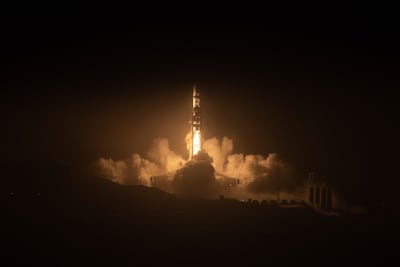A university in Saudi Arabia has launched a miniature satellite to space to help researchers monitor natural resources in the kingdom and around the world.
The Earth observation nanosatellite, built by the King Abdullah University of Science and Technology, will collect high-resolution data across global terrestrial, coastal and ocean ecosystems.
A SpaceX Falcon 9 rocket carried the 6-unit CubeSat — an advanced modular satellite — to orbit from a California spaceport on Saturday.
A Dewa nanosatellite, built by Dubai's utility authority, was launched on the same ride-share mission.
“We're launching state-of-the-art technology on this satellite platform,” said Matthew McCabe, professor of remote sensing and water security at the university.
“It's shared knowledge, and a shared community resource. Developing a community of scientists and collaborators who can access this data will bring global perspectives to local and regional questions that we’re trying to address.”

The satellite has a hyperspectral imager, or scientific camera, that integrates with the on-board processing sensor, helping it to analyse data before it is beamed back to Earth.
Researchers will also use the satellite to get data that can help with the kingdom's Vision 2030 goals, such as protecting and restoring the environment.
The hyperspectral imager, for example, can be used to characterise terrestrial and marine systems.
This will allow scientists to assess conditions of rangelands, soils, mangroves and other plant communities.
“This is the type of mission that we want to be able to see into the future — building innovation and technology in the kingdom, training the next generation of scientists and engineers, and facilitating further space exploration from Saudi Arabia,” Prof McCabe said.
The kingdom has a renewed interest in space exploration and has launched a long-term programme that includes satellite development, human space flight missions and deep-space missions in the future.
On May 8, two Saudi astronauts, Rayyanah Barnawi and Ali Al Qarni, will travel to the International Space Station for a 10-day stay.
The trip comes nearly 40 years after Saudi Arabia sent its first citizen to space. Prince Sultan bin Salman spent a week on Nasa's Space Shuttle in 1985.

